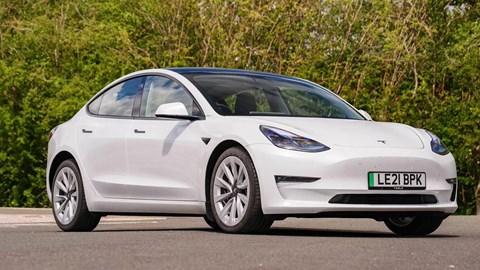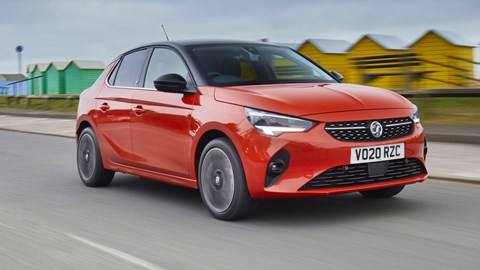► Worst March registrations since 1998
► But EV sales rocket up 78.7%
► One in three cars sold now electrified
March 2022 posted the worst car sales for that month since 1998. While 243,479 cars were still registered, that’s a 14.3% reduction year-on-year – and this in a new number plate month, which typically accounts for around 20% of the overall annual figure.
However, while there’s doom, it’s not all gloom, as March 2022 was still the best month on record for electric car sales, with 39,315 of them finding new homes. That’s not only a 78.7% increase over March 2021, it’s more electric cars than were sold in all of 2019. The top two bestselling cars in March 2022 were both Teslas.
All figures quoted are according to the SMMT.
So what’s going on?
Tempting though it might be to blame the current cost-of-living crisis, while that may be a factor it does not appear to be buyers’ demand for new cars that’s causing sales to fall so sharply but continuing issues with supply.
This is a now a huge steaming pile of multiple problems, kicked off by the pandemic. Semiconductors and other components still aren’t back to full availability, there are supply chain problems, material issues and other factors exacerbated by the conflict in Ukraine.
An absolute maelstrom of circumstances that’s also continuing to drive the cost of used cars through the roof, as people unprepared to join lengthy waiting lists for new cars seek a change of wheels on the secondhand market instead.
And out of the chaos rise electric cars?
Not only have battery electric vehicles (BEVs) seen a 78.7% increase in March 2022 compared with March 2021, sales are up 101.9% since the start of the year compared with the same period last year.
Add in other forms of electrification – mild-hybrid, hybrid and plug-in hybrid – and one in three vehicles sold in March 2022 had at least some kind of assistance over a conventional combustion engine.

By contrast, diesel is down 51.2% since the start of the year and now holds a market share of just 5.7%. BEVs alone now have a 15.4% market share – though conventional petrol still dominates with 42.6% of the market.
Rising energy costs are playing a part in this, as consumers looks to switch to more efficient means of transport – even with electricity massively more expensive than it was, it’s still cheaper to charge an electric car at home – as our comparison of EVs running costs show – than pay at the pumps despite fuel prices beginning to fall.
But many electric cars are built with more modern electronic components than combustion cars, so feel less impact from the chip crisis, while incentives and eco desires make them better business. If you’re going to keep production running somewhere these are a good place to focus right now.
What is the car industry saying about all this?
There has been quite a bit of comment already, as you can probably imagine.
SMMT chief executive Mike Hawes: ‘March is typically the biggest month of the year for the new car market, so this performance is deeply disappointing and lays bare the challenges ahead. While demand remains robust, this decline illustrates the severity of the global semiconductor shortage, as manufacturers strive to deliver the latest, lowest emission vehicles to eagerly awaiting customers.
‘Placing orders now will be beneficial for those looking to take advantage of incentives and lower running costs for electric vehicles, especially as the Ukraine crisis could affect supply still further. With increasing household and business costs, government must do all it can to support consumers so that the growth of electric vehicles can be sustained and the UK’s ambitious net zero timetable delivered.’
Automotive director and head of electric vehicles at Deloitte, Jamie Hamilton: ‘We expect more significant sales to be felt in September when the next plate change is due. Many dealers have put in their orders now to build a pipeline of stock in preparation.
‘It’s clear that the automotive industry is still recovering from the pandemic, with momentum regularly stalled by supply issues. The sector now faces new economic challenges; most notably with high levels of inflation and a squeeze on the cost of living. Combined, these factors have contributed to a sharp decline in consumer and economic confidence, dampening any underlying pent-up demand for new cars.’

CEO of AA Cars, James Fairclough: ‘While the volume of sales is down, there is a rapid transformation underway in what drivers are buying. Diesels continue to fall out of favour, and during the first quarter of 2022 they accounted for barely 5% of all new cars sold – half the market share they enjoyed during the first three months of 2021. At this rate, new diesel sales will be all but over long before they are banned in 2030.
‘At the other end of the spectrum, electric vehicle sales continue to go from strength to strength, posting their best ever month in March. More battery EVs were sold in March than were sold in the entirety of 2019.’
What were the bestselling cars in March 2022, then?
The top two spots were taken by the Tesla Model Y (6464 sales) and the Tesla Model 3 (6457) – though Tesla’s sales are often cyclical due to the period arrival of supply that then generates lots of registrations at once.
Underlining this point, the third bestselling car was still the Vauxhall Corsa (5,515), which is also the top selling car of the 2022 so far.
Notably, every other car in the March 2022 top 10 was an SUV (in order: Nissan Qashai, Hyundai Tucson, Ford Puma, Kia Sportage, Ford Kuga, Toyota CH-R) except the Ford Fiesta. Which rounded out the list in 10th.